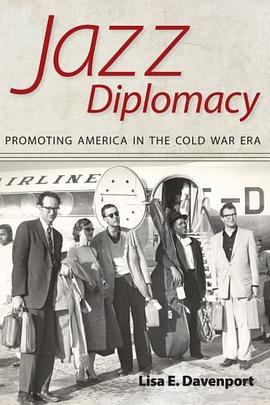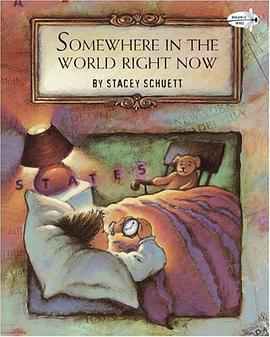

具体描述
Jazz as an instrument of global diplomacy transformed superpower relations in the Cold War era and reshaped democracy?‚'s image worldwide. Lisa E. Davenport tells the story of America?‚'s program of jazz diplomacy practiced in the Soviet Union and other regions of the world from 1954 to 1968. Jazz music and jazz musicians seemed an ideal card to play in diminishing the credibility and appeal of Soviet communism in the Eastern bloc and beyond. Government-funded musical junkets by such jazz masters as Louis Armstrong, Dave Brubeck, Duke Ellington, Dizzy Gillespie, and Benny Goodman dramatically influenced perceptions of the U.S. and its capitalist brand of democracy while easing political tensions in the midst of critical Cold War crises. This book shows how, when coping with foreign questions about desegregation, the dispute over the Berlin Wall, the Cuban missile crisis, Vietnam, and the Soviet invasion of Czechoslovakia, jazz players and their handlers wrestled with the inequalities of race and the emergence of class conflict while promoting America in a global context. And, as jazz musicians are wont to do, many of these ambassadors riffed off script when the opportunity arose.Jazz Diplomacy argues that this musical method of winning hearts and minds often transcended economic and strategic priorities. Even so, the goal of containing communism remained paramount, and it prevailed over America?‚'s policy of redefining relations with emerging new nations in Africa, Asia, and Latin America.
作者简介
目录信息
读后感
评分
评分
评分
评分
用户评价
《爵士外交》这个标题,像是在进行一场跨界对话,将充满自由精神的爵士乐与严谨的国家交往艺术——外交,巧妙地联系起来。我第一反应是,这会不会是一本关于音乐家们如何成为国家形象代言人的书?或者,是关于一些国家如何巧妙地利用爵士乐作为文化输出的工具,从而在国际舞台上赢得影响力?这本书的潜力,让我充满了探索的欲望。 我脑海中浮现的,是那些在国际舞台上纵横捭阖的外交家,他们如何在高压的环境下,做出影响世界格局的决策。而爵士乐,以其独特的即兴、自由和包容的特质,是否也为他们提供了某种灵感,或者是一种不落俗套的沟通方式?书中是否会描绘一些历史上著名的人物,他们是如何将对爵士乐的理解,转化为外交策略的?例如,如何用爵士乐的“call and response”模式来处理危机,或者如何用它的“swing”节奏来带动谈判的气氛? 我特别好奇,《爵士外交》是否会深入分析爵士乐作为一种“软实力”的传播机制。在信息爆炸的时代,国家之间的竞争,往往体现在文化吸引力和价值观的输出上。爵士乐,作为一种具有世界性影响力的音乐风格,是如何在全球范围内传播其独特的文化基因,并潜移默化地影响着其他国家人民的思维方式和生活习惯?书中是否会引用一些具体的案例,来展示这种“文化渗透”的威力? 再者,我想这本书可能会探讨“即兴”在外交中的重要性。正如爵士乐的演奏者需要在瞬间捕捉旋律的灵感,并在既有的框架内自由发挥一样,外交官们也需要在瞬息万变的国际局势中,迅速做出反应,寻找最佳的解决方案。书中是否会通过分析一些历史上的经典外交案例,来阐释这种“即兴外交”的艺术?它是否意味着,成功的“外交”,并非完全依赖于事先的周密计划,而同样需要一种对当下情境的敏锐把握和创造性的应变能力? 我期待书中能够展现爵士乐如何成为一种跨越国界、跨越文化障碍的通用语言。在不同国家、不同文化背景的人们,也许在政治观点、生活习惯上存在差异,但他们却可能因为共同对某段爵士乐的喜爱而产生共鸣。这种音乐带来的情感连接,是否能够转化为国家间的理解和友谊?书中是否会讲述一些因爵士乐而结缘的故事,这些故事又如何影响了国家之间的关系? 我甚至会猜想,书中是否会涉及一些音乐家,他们在艺术创作之外,还扮演了某种非正式的“外交角色”。也许是受邀参加国家级的文化交流活动,也许是因其音乐作品的传播,而无意中成为了某个国家的“文化使者”。这些个体的经历,可能会为我们提供一个更加生动、更加人性化的视角,来理解“爵士外交”的实际运作。 《爵士外交》听起来,就像一本关于“听懂世界”的指南。它不仅仅是关于音乐的技巧,更关乎理解、包容、以及如何用一种更具艺术性的方式,去处理复杂的人类关系。 它提出的“爵士外交”,让我看到了文化与政治之间更深层次的联系,也让我对未来国际交往的可能性充满了期待。 它让我相信,有时候,一段充满灵魂的旋律,可能比千言万语更能打动人心,更能化解矛盾。
评分《爵士外交》这个名字,在我脑海中立刻勾勒出了一幅画面:在某个充满异域风情的晚宴上,衣冠楚楚的各国代表,在品尝着精致的美食,聆听着悠扬的爵士乐。这种音乐,本身就带着一种优雅、自由、包容的气质,仿佛能瞬间融化掉那些隔阂与戒备。我迫不及待地想知道,这本书究竟是如何将这种音乐的魅力,与国家层面的外交活动联系起来的。 我猜想,书中可能会深入剖析爵士乐作为一种文化输出的工具,是如何被巧妙地运用在国际舞台上的。例如,在冷战时期,美国如何利用爵士乐来展现其自由民主的形象,以此来吸引和影响其他国家,特别是那些尚未选边站队的国家。书中是否会详细介绍那些著名的爵士乐团的海外巡演,以及这些巡演在当地引起的轰动效应?这些音乐家们,是否被赋予了某种“文化大使”的身份,他们的每一次演出,都是一次无声的外交行动? 更深层次的,我好奇这本书是否会探讨爵士乐的“即兴”特性,与外交决策之间的联系。在复杂的国际关系中,外交官们往往需要面临突如其来的危机和变数,他们需要有能力在短时间内做出最合适的反应。而爵士乐的即兴演奏,正是这种“随机应变”和“在规则内自由发挥”的极致体现。书中是否会通过分析一些具体的历史事件,来阐释这种“即兴外交”的智慧? 我也对书中可能涉及的“跨文化理解”方面的内容充满期待。爵士乐本身就是一种融合了多种音乐风格和文化元素的艺术形式。它起源于非裔美国人的音乐传统,却又吸收了欧洲的古典音乐、拉丁美洲的节奏等多种元素。这种包容性和融合性,是否也为“爵士外交”提供了一种范本?它是否会讲述一些关于不同文化背景下的爵士乐爱好者,如何因为共同的音乐爱好而建立起跨越国界的友谊和理解的故事? 我设想,《爵士外交》中或许会呈现一些令人意想不到的人物故事。那些在音乐和政治两个领域之间穿梭的人物,他们的生活轨迹一定会充满传奇色彩。也许书中会描绘一些在历史上扮演重要角色的外交官,他们本身就是一位技艺精湛的爵士乐演奏者,或者他们对爵士乐有着深刻的理解,并将其运用到自己的外交实践中。这些人物的视角,将为我们提供一个更加立体、更加人性化的“爵士外交”图景。 同时,我也对书中对于“软实力”的解读感到好奇。在当今世界,国家之间的竞争,不仅仅体现在军事和经济实力上,更体现在文化吸引力和价值观的传播上。爵士乐作为一种独特的文化符号,在提升一个国家的国际形象和影响力方面,起到了怎样的作用?书中是否会分析,那些以爵士乐为代表的文化产品,是如何在潜移默化中,影响着其他国家人民的观念和认知? 我甚至会猜想,这本书是否会从一个更宏观的视角,来审视爵士乐在全球化进程中的地位。在全球化的浪潮中,各种文化相互碰撞、融合,爵士乐又是如何在这种大背景下,既保持自身独特的风格,又能适应不同的文化环境,并最终成为一种具有世界性影响力的音乐形式?这种适应性和生命力,是否也正是“爵士外交”所需要的特质? 我期待《爵士外交》能够带领我们去发现,音乐的力量远不止于娱乐,它同样能够成为一种连接心灵、促进理解、化解冲突的强大工具。它或许会让我们重新审视那些看似遥远的外交事务,从一个全新的、充满艺术感的视角去理解它们。 这本书不仅仅是关于音乐,也不仅仅是关于外交,它是一次关于文化、历史、政治与人性的深刻探索。 它提出的“爵士外交”概念,让我觉得充满新意,它暗示着一种打破常规、以情感和艺术作为纽带的外交方式,这本身就极具吸引力。
评分读完《爵士外交》的扉页,我的思绪已经开始在爵士乐的自由旋律和国际政治的严谨逻辑之间游走。这个标题本身就像一首充满张力的爵士乐,低沉的贝斯线(外交的基石)与悠扬的萨克斯风(音乐的灵动)巧妙地结合,预示着一场关于文化与权力、艺术与策略的深刻对话。我很好奇,这本书将如何解构“爵士”这一音乐形式中蕴含的政治密码,又如何阐释“外交”这一实践领域中的艺术魅力。 我脑海中浮现的,是那些身着西装、表情严肃的外交官,他们如何在香烟缭绕的会议室里,用枯燥的报告和冗长的谈判推动着世界格局。而当他们偶然听到一段爵士乐,或者甚至亲自尝试演奏时,那份紧绷的神经是否会因此放松?书中是否会讲述一些鲜为人知的故事,关于那些在国际舞台上游刃有余的外交家,其实也是爵士乐的狂热爱好者,他们如何将爵士乐的即兴精神、和声的丰富性,亦或是 Swing 的律动感,巧妙地融入到自己的外交策略中,从而化解僵局,创造出意想不到的突破? 我想,《爵士外交》很有可能颠覆我们对传统外交的刻板印象。它或许会揭示,在那些看似冰冷的政治博弈背后,音乐,特别是充满自由精神的爵士乐,是如何扮演着一种润滑剂、一种沟通的桥梁,甚至是一种“软实力”的催化剂。书中是否会引用历史上的具体案例,例如,在某些国家,爵士乐如何作为一种反主流文化符号,却又被政府巧妙地利用,成为对外展示其开放和自由形象的工具?这种矛盾而又精妙的运用,本身就足以引人深思。 我期待书中能够深入探讨爵士乐的“即兴”特质与外交决策之间的联系。在瞬息万变的国际局势中,外交官们往往需要临机应变,在有限的信息和复杂的情况下做出判断。而爵士乐的即兴演奏,恰恰是这种在规则内自由发挥的极致体现。书中是否会分析,那些擅长即兴的爵士乐手,他们的思维模式和决策过程,是否与那些在危机时刻能够游刃有余的外交官有着某种共通之处?这种跨领域的类比,无疑会为我们提供一种全新的视角来理解外交的智慧。 此外,这本书的“外交”部分,我想也并非仅仅局限于国家间的正式交往。它或许还会触及到更广泛的文化交流层面。那些在世界各地巡演的爵士乐团,他们不仅仅是在表演音乐,更是在传播一种生活方式,一种思想观念,一种文化符号。书中是否会描绘,爵士乐是如何在不同国家和地区生根发芽,与当地的音乐文化相互碰撞,最终形成独特而又具有世界性的音乐风格?这种文化融合的过程,本身就是一种“外交”,一种非官方的、却又至关重要的国际交流。 我对书中可能涉及的“文化输出”和“意识形态对抗”部分尤为好奇。在冷战时期,美国就曾积极推广爵士乐,将其作为对抗苏联意识形态宣传的有力武器。书中是否会详细分析,这种“文化外交”是如何进行的?它的策略是什么?它在不同的国家和地区产生了怎样的影响?又或者,它是否会揭示,爵士乐本身所蕴含的自由、平等、个性的精神,是如何在不知不觉中,对一些国家的社会变革产生深远的影响? 我甚至会设想,书中是否会涉及到一些爵士乐手,他们本身也扮演着某种“外交角色”。也许他们会因为自己的音乐而结识了外国的政要,或者因为某次演出而成为了文化交流的非官方大使。这些人物的视角,会为我们提供一个更加生动、更加接地气的“爵士外交”图景,让我们看到,在宏大的政治叙事之外,个体的情感和艺术的魅力,同样能够产生巨大的力量。 《爵士外交》的出现,仿佛在提醒我们,理解世界,不应仅仅依靠政治分析和经济数据。音乐,作为人类共通的情感语言,同样拥有着连接心灵、消弭隔阂的强大力量。我希望这本书能够通过对爵士乐与外交之间关系的探索,为我们打开一扇新的窗口,让我们看到一个更加多元、更加富有想象力的国际关系图景。 我期待这本书能像一段精彩的爵士乐独奏,在理性的框架下,尽情挥洒创意的火花,带给读者独特的思考和惊喜。它不是一本枯燥的学术著作,也不是一本浅显的娱乐读物,而是一次关于艺术、历史、政治与人文的深度融合。 它提出的“爵士外交”概念,让我脑海中涌现出无数的可能性,它暗示着一种更为柔和、更为艺术化的国际交往方式,或许,这才是未来解决冲突、增进理解的更有效途径。
评分《爵士外交》这个书名,如同一曲低沉的萨克斯风,在我的心头轻轻吹响,预示着一段关于文化、政治与人性的深刻探索。它将爵士乐那种自由、即兴、包容的音乐精神,与国家间复杂的交往艺术——外交,巧妙地联系起来,让我对这本书的独特视角充满了好奇。 我迫不及待地想知道,书中是如何解析爵士乐本身所蕴含的“外交”潜力的。爵士乐,作为一种起源于多元文化融合的音乐形式,其本身就体现了一种超越界限、求同存异的精神。它是否也为国家间的交往提供了某种范本?书中是否会分析,那些在爵士乐中展现出的“call and response”(呼应)和“interplay”(互动)的特质,如何能被运用到外交谈判和危机处理中? 我期待,《爵士外交》能够深入探讨爵士乐作为一种“文化大使”的角色。在国际舞台上,音乐不仅仅是艺术的表达,更是一种文化的输出。爵士乐,以其独特的魅力,是如何在世界各地赢得听众,并潜移默化地影响着人们对特定国家文化的认知?书中是否会引用一些具体的历史案例,例如,某些国家如何利用爵士乐的推广,来提升其国际形象,或者如何通过支持爵士音乐的发展,来促进民间的文化交流? 再者,我非常好奇书中对“即兴”的探讨。爵士乐的灵魂在于即兴,音乐家们在演奏中展现出惊人的创造力和应变能力。这种能力,是否也能在外交领域找到对应?在瞬息万变的国际局势中,外交官们同样需要具备快速反应和临机应变的智慧。书中是否会通过分析一些经典的外交事件,来阐释这种“即兴外交”的艺术?它是否意味着,成功的“外交”,同样需要一种敏锐的洞察力和创造性的思维? 我甚至会猜想,书中是否会涉及一些音乐家,他们在艺术创作之外,还扮演了某种非官方的“外交角色”。也许是因其音乐的国际声誉,而成为国家形象的代言人;也许是因其艺术活动,而促进了不同国家人民之间的交流。这些个体的故事,将为宏大的“爵士外交”概念,注入温暖的人性色彩,让我们看到,艺术的魅力,同样能够影响国际格局。 《爵士外交》听起来,就像一本关于“用音乐沟通世界”的指南。它不仅仅是关于音乐的技巧,更关乎理解、包容、以及如何用一种更具艺术性的方式,去处理复杂的人类关系。 它提出的“爵士外交”,让我看到了文化力量在国际关系中的巨大潜力,也让我对未来的人类沟通方式充满了憧憬。 它让我相信,有时候,一段充满灵魂的旋律,可能比千言万语更能打动人心,更能化解矛盾。
评分《爵士外交》这个书名,如同一首悠扬的爵士乐,在我的脑海中回荡。它将音乐的自由与即兴,与政治的严谨与策略,以一种令人着迷的方式结合起来。我迫不及待地想知道,这本书将如何揭示,在国家间的博弈中,音乐的力量究竟能发挥多大的作用。 我非常好奇,书中是否会深入探讨爵士乐作为一种“软实力”的传播机制。在当今世界,国家之间的竞争,早已超越了传统的军事和经济层面,而更多地体现在文化吸引力和价值观的输出上。爵士乐,作为一种具有全球影响力的音乐风格,是如何在潜移默化中,塑造着人们对特定国家形象的认知?书中是否会引用具体的历史事件,例如,美国如何在上世纪中期,通过大力推广爵士乐,来塑造其开放、自由、进步的国家形象,从而在意识形态竞争中占据优势? 再者,我对书中对“即兴”这一爵士乐核心元素的解读,以及它与外交决策的类比,充满了期待。在复杂多变的国际局势中,外交官们需要具备高度的应变能力,能够在突发事件面前迅速做出反应。而爵士乐的即兴演奏,正是这种“随机应变”和“在规则内自由发挥”的极致体现。书中是否会通过分析一些历史上的经典外交事件,来阐释这种“即兴外交”的智慧?它是否意味着,成功的“外交”,同样需要一种敏锐的洞察力、强大的临场发挥能力和创造性的思维? 我期待,《爵士外交》能够展现爵士乐如何成为一种跨越语言、文化、意识形态的通用桥梁。在不同的国家和文化背景下,人们也许在政治观点、生活习惯上存在差异,但他们却可能因为一段动听的爵士乐而产生共鸣。书中是否会讲述一些关于因爵士乐而建立的跨国友谊,这些友谊又如何对国家间的关系产生积极影响? 我甚至会猜想,书中是否会涉及一些音乐家,他们在艺术创作之外,还扮演了某种非官方的“外交角色”。也许是因其音乐的国际声誉,而成为国家形象的代言人;也许是因其艺术活动,而促进了不同国家人民之间的交流。这些个体的故事,将为宏大的“爵士外交”概念,注入温暖的人性色彩,让我们看到,艺术的魅力,同样能够影响国际格局。 《爵士外交》听起来,就像一本关于“用音乐沟通世界”的指南。它不仅仅是关于音乐的技巧,更关乎理解、包容、以及如何用一种更具艺术性的方式,去处理复杂的人类关系。 它提出的“爵士外交”,让我看到了文化力量在国际关系中的巨大潜力,也让我对未来的人类沟通方式充满了憧憬。 它让我相信,有时候,一段充满灵魂的旋律,可能比千言万语更能打动人心,更能化解矛盾。
评分《爵士外交》这个书名,就像一首低语的爵士乐,在静谧的夜晚,娓娓道来。它勾勒出一种充满艺术气息和智慧的外交图景,让我对接下来的内容充满了无限的遐想。我很好奇,作者将如何在这两者之间找到共同的语言,又将如何揭示音乐的力量在国家交往中所扮演的隐秘角色。 我想,书中很可能会深入挖掘爵士乐在传播中的“文化输出”层面。爵士乐,作为一种极具辨识度的音乐风格,本身就承载着特定的文化基因。它如何在世界各地生根发芽,并与当地的音乐文化相互碰撞、融合,最终成为一种具有全球影响力的艺术形式?更重要的是,这种传播过程,是否被国家作为一种“软实力”的工具,用来增进国家形象、扩大国际影响力?例如,书中是否会详细介绍,某些国家如何通过资助爵士乐团的海外巡演,来传递其价值观,并吸引年轻一代的关注? 我尤其期待书中对“即兴”的探讨。爵士乐最迷人的特质之一,便是其高度的即兴性。音乐家们在既定的音乐框架内,能够自由发挥,创造出独一无二的旋律。这种能力,是否也能在外交领域找到映照?在瞬息万变的国际局势中,外交官们是否需要具备类似的“即兴”智慧,能够在突发事件面前,快速做出精准的判断和有效的应对?书中是否会通过分析一些经典的外交案例,来论证“即兴外交”的有效性? 此外,我希望《爵士外交》能够展现爵士乐如何成为一种跨越国界、跨越文化鸿沟的“通用语言”。不同国家的人们,也许在政治理念、宗教信仰上存在差异,但他们却可能因为一段动听的爵士乐而产生共鸣。书中是否会讲述一些因爵士乐而建立的跨国友谊,这些友谊又如何对国家间的关系产生积极影响?这种音乐带来的情感连接,是否能够为更深层次的理解和合作奠定基础? 我甚至会设想,书中是否会涉及一些音乐家,他们在艺术创作之外,还扮演了某种非官方的“外交角色”。也许是因其音乐的国际声誉,而成为国家形象的代言人;也许是因其艺术活动,而促进了不同国家人民之间的交流。这些个体的故事,将为宏大的“爵士外交”概念,注入温暖的人性色彩,让我们看到,艺术的魅力,同样能够影响国际格局。 《爵士外交》听起来,就像一本关于“用音乐沟通世界”的指南。它不仅仅是关于音乐的技巧,更关乎理解、包容、以及如何用一种更具艺术性的方式,去处理复杂的人类关系。 它提出的“爵士外交”,让我看到了文化力量在国际关系中的巨大潜力,也让我对未来的人类沟通方式充满了憧憬。 它让我相信,有时候,一段充满灵魂的旋律,可能比千言万语更能打动人心,更能化解矛盾。
评分《爵士外交》这个书名,如同一颗璀璨的宝石,在众多图书中闪耀着独特的光芒。它将音乐的自由与灵动,与政治的严谨与博弈,以一种看似矛盾却又充满吸引力的方式结合在一起。我迫不及待地想知道,这本书究竟是如何揭示这两种看似风马牛不相及的领域之间,潜藏的深刻联系。 我猜想,书中很可能会深入探讨爵士乐作为一种“软实力”的运作机制。在当今世界,国家之间的竞争,早已超越了传统的军事和经济层面,而更多地体现在文化影响力和价值观的传播上。爵士乐,作为一种具有全球影响力的音乐形式,是如何在潜移默化中,塑造着人们对特定国家形象的认知?书中是否会引用具体的历史事件,例如,美国如何在上世纪中期,通过大力推广爵士乐,来塑造其开放、自由、进步的国家形象,从而在意识形态竞争中占据优势? 更让我好奇的是,书中是否会分析爵士乐的“即兴”精神,与外交决策之间的关联。在瞬息万变的国际局势中,外交官们常常需要在信息不完全、条件受限的情况下,迅速做出判断和决策。而爵士乐的即兴演奏,正是这种“随机应变”和“在规则内自由发挥”的极致体现。书中是否会通过一些引人入胜的案例,来阐释这种“即兴外交”的智慧?它是否意味着,成功的“外交”,需要像爵士乐手一样,拥有敏锐的洞察力、强大的应变能力和创造性的思维? 我期待,《爵士外交》能够展现爵士乐如何成为一种跨越语言、文化、意识形态的通用桥梁。在不同的国家和文化背景下,人们或许在政治理念、宗教信仰上存在分歧,但他们却可能因为一段动听的爵士乐而产生共鸣。书中是否会讲述一些关于不同文化背景下的爵士乐爱好者,如何因为共同的音乐爱好而建立起深厚的友谊,甚至这种友谊如何延伸到国家层面的互动? 我甚至会设想,书中是否会描绘一些在历史上扮演重要角色的音乐家,他们在音乐事业之外,还承担着某种非官方的“外交使命”。也许是因其音乐的魅力而结识了外国政要,也许是因其艺术影响力而促进了国家间的文化交流。这些人物的视角,无疑会为我们提供一个更加生动、更加人性化的“爵士外交”图景。 《爵士外交》听起来,不仅仅是一本关于音乐的书,更是一本关于文化、历史、政治与人性的深刻解读。它让我看到了,在那些看似冰冷的政治博弈背后,艺术的力量是如何悄无声息地发挥着重要作用。 它提出的“爵士外交”概念,让我耳目一新,它暗示着一种更具创造性、更富有人情味的外交方式,这本身就极具吸引力。 它让我相信,有时候,一段和谐的旋律,能够带来的理解和共鸣,可能远胜于冗长的谈判和官方声明。
评分《爵士外交》这个书名,就像一串变幻莫测的爵士乐和弦,一下子就抓住了我的注意力。它听起来充满了一种低调的智慧,一种在不经意间就能产生巨大影响力的力量。我很难想象,音乐,特别是爵士乐这种充满即兴和自由精神的音乐,是如何与国家间的官方交往——外交,发生联系的。这本书,无疑为我打开了一个全新的思考维度。 我非常好奇,作者会如何解析爵士乐本身所蕴含的“外交”特质。爵士乐的起源,是多种文化元素的融合;它的演奏,强调的是individualism(个人主义)与ensemble(整体合作)的平衡;它的精神,是自由、创新与打破藩篱。这些特质,是否能够被巧妙地映射到外交的实践中?例如,在多边会谈中,各国代表的“solo”(独奏)与整体的“groove”(律动)如何协调?又例如,在应对突发事件时,是否需要像爵士乐手那样,具备高度的“call and response”(呼应)能力和“improvisation”(即兴)的智慧? 我设想,书中可能会包含一些鲜为人知的历史故事。或许会讲述,在某些特定的历史时期,爵士乐是如何被作为一种“文化武器”或“软实力”工具,被国家机器所运用。例如,美国如何利用爵士乐的普及,来对抗苏联的意识形态宣传;或者,某个国家如何通过支持爵士乐的发展,来提升其国际形象和文化影响力。这些故事,如果能被细致地挖掘和呈现,无疑会非常引人入胜。 我对书中对“即兴”的深入探讨充满期待。在外交领域,正如爵士乐的演奏一样,很多时候都需要临场应变,在复杂多变的环境中寻找最优解。书中是否会分析,那些在外交领域取得卓越成就的人物,他们是否都具备某种“爵士精神”?他们如何在这种“游戏”中,既遵守规则,又能够发挥创意,最终达成目标?这种对“即兴”的理解,可能会颠覆我们对外交官们刻板、谨慎的印象。 此外,我非常期待书中能够展现爵士乐在全球范围内的传播,以及它如何与不同文化发生碰撞与融合。爵士乐并非是一种单一的音乐风格,它在世界各地发展出了不同的变体,比如欧洲爵士、拉美爵士等。这种文化适应性和多元化的发展,是否也为“爵士外交”提供了某种启示?它是否意味着,真正的“外交”,也需要以一种开放、包容、理解的态度,去适应和尊重不同的文化,而不是强行输出和同化? 我甚至会猜想,书中是否会提及一些音乐家,他们在音乐生涯之外,还承担着某种非官方的“外交使命”。也许是一些因音乐而结识了外国政要的艺术家,也许是一些通过文化交流活动,促进了国家间理解的音乐人。这些个体的故事,将为宏大的“爵士外交”概念,注入温暖的人性色彩。 《爵士外交》听起来就像一部充满智慧的侦探小说,它隐藏在音乐的旋律和政治的字里行间,等待着我们去发掘。它不仅仅是在讲述音乐,更是在探讨一种全新的、更具艺术性的国际交往模式。 它所提出的“爵士外交”,让我看到了文化力量在国际关系中的巨大潜力,也让我对未来的人类沟通方式充满了憧憬。 它让我相信,有时候,最有效的沟通,并非来自激烈的辩论,而是来自一段默契的音乐,一种共同的文化体验。
评分《爵士外交》这个书名,如同一首充满暗示的爵士乐序曲,瞬间点燃了我内心的好奇。它将两种截然不同的元素——爵士乐的自由、即兴,以及外交的策略、严谨,巧妙地融合在一起,预示着一场关于文化、历史、政治的深度探索。我迫不及待地想知道,这本书将如何揭示音乐的旋律与国家命运的交织。 我非常好奇,书中是否会深入剖析爵士乐作为一种“文化符号”的政治意涵。爵士乐,起源于美国黑人群体,却又发展成为一种具有世界性影响力的音乐风格。它在传播的过程中,是否被赋予了特定的政治解读?例如,在冷战时期,美国是否曾将爵士乐作为一种“自由民主”的象征,来对抗苏联的意识形态?书中是否会详细介绍,这些“文化外交”的具体实践,以及它们在不同国家和地区产生的实际效果? 再者,我对书中对“即兴”这一爵士乐核心元素的解读,以及它与外交决策的类比,充满了期待。在复杂多变的国际关系中,外交官们需要具备高度的应变能力,能够在突发事件面前迅速做出反应。而爵士乐的即兴演奏,正是这种“随机应变”和“在规则内自由发挥”的极致体现。书中是否会通过分析一些历史上的经典外交事件,来阐释这种“即兴外交”的智慧?它是否意味着,成功的“外交”,同样需要一种敏锐的洞察力、强大的临场发挥能力和创造性的思维? 我期待,《爵士外交》能够展现爵士乐如何超越语言和文化的障碍,成为一种促进国际理解的有效媒介。在不同的文化背景下,人们也许在价值观、生活方式上存在差异,但他们却可能因为一段动听的爵士乐而产生共鸣。书中是否会讲述一些关于因爵士乐而建立的跨国友谊,这些友谊又如何对国家间的关系产生积极影响? 我甚至会猜想,书中是否会涉及一些音乐家,他们在艺术创作之外,还扮演了某种非官方的“外交角色”。也许是因其音乐的国际声誉,而成为国家形象的代言人;也许是因其艺术活动,而促进了不同国家人民之间的交流。这些个体的故事,将为宏大的“爵士外交”概念,注入温暖的人性色彩,让我们看到,艺术的魅力,同样能够影响国际格局。 《爵士外交》听起来,就像一本关于“用音乐沟通世界”的指南。它不仅仅是关于音乐的技巧,更关乎理解、包容、以及如何用一种更具艺术性的方式,去处理复杂的人类关系。 它提出的“爵士外交”,让我看到了文化力量在国际关系中的巨大潜力,也让我对未来的人类沟通方式充满了憧憬。 它让我相信,有时候,一段充满灵魂的旋律,可能比千言万语更能打动人心,更能化解矛盾。
评分这本书的标题《爵士外交》让我充满了好奇。爵士乐,作为一种充满即兴、融合与自由的音乐形式,其本身就蕴含着打破界限、跨越文化的特质。而“外交”一词,则让人联想到国家间的沟通、理解与合作,以及那些在幕后默默工作的智慧与策略。将这两者结合,不禁让人遐想,究竟会是一段怎样的故事?是讲述音乐家们如何用爵士乐在国际舞台上传播友谊,还是揭示了某些国家如何巧妙地利用爵士乐作为文化输出的工具,从而在政治和经济上获得优势? 我期待这本书能够深入探讨爵士乐与外交之间的微妙联系。也许它会带领我们回到那个风起云涌的年代,例如冷战时期,当美苏两国在意识形态上激烈对抗时,爵士乐如何成为美国向世界展示其自由民主价值观的“文化武器”。书中是否会引用具体的历史事件,例如那些由美国国务院资助的爵士乐巡演,以及这些巡演在当地引起的巨大反响?这些音乐家们,肩负着国家使命,在异国他乡的舞台上,用他们的音乐奏响和平的乐章,又或者,是在不经意间,播下了改变当地文化格局的种子。 更进一步,我希望《爵士外交》能够挖掘爵士乐在其中所扮演的更深层次的角色。爵士乐本身就起源于多元文化的碰撞与融合,它的即兴性、对个人表达的尊重,以及在复杂节奏中的和谐统一,是否在潜移默化中影响了外交官们的思维方式?是否那些精通爵士乐的外交家,在谈判桌上更能理解对方的“节奏”,更能找到“和弦”的契合点?或者,书中所描绘的外交,并非仅仅是官方层面的你来我往,而是包括了民间交流、艺术家的对话,甚至是普通听众之间因音乐而产生的共鸣。 我特别对书中可能涉及的“软实力”方面感兴趣。在国际关系中,国家形象和文化吸引力往往扮演着至关重要的角色。《爵士外交》是否会分析,爵士乐是如何成为一种独特的、具有强大感染力的文化符号,从而提升一个国家的国际声誉和影响力?那些奔赴海外的爵士乐手,不仅仅是音乐的表演者,更是文化交流的使者,他们的每一次演奏,每一次与当地音乐人的合作,是否都在悄无声息地构建着一个国家在世界人民心中的形象? 此外,这本书的标题也引发了我对“不寻常”的外交手段的思考。传统的 diplomat 们,或许更多地依赖于笔墨、言语和协议。而《爵士外交》是否会展现出一种更加生动、更加富有艺术性的外交模式?例如,通过邀请外国政要参加爵士音乐会,让他们在轻松愉悦的氛围中感受到异国文化,从而放下戒备,增进了解。或者,将爵士乐的创作理念,例如“call and response”(呼应)以及“interplay”(互动),巧妙地运用到国际谈判和危机处理的策略中。 我设想,《爵士外交》中或许会包含一些令人意想不到的人物故事。那些在音乐和政治之间穿梭的人物,他们的生活经历一定是丰富多彩的。或许会描绘一些著名的爵士乐手,在他们的音乐生涯之外,还肩负着不为人知的“外交任务”。又或者,是一些在外交领域有所建树的人物,他们对爵士乐有着深厚的感情,并且将其作为自己外交理念的重要组成部分。这些人物的视角,将为我们呈现一个更加立体、更加人性化的“爵士外交”图景。 这本书的篇幅可能涉及不同国家和地区。爵士乐在全球范围内的传播,以及它与当地文化产生的化学反应,想必会是书中浓墨重彩的部分。《爵士外交》是否会对比不同文化背景下的爵士乐发展,以及这些发展如何与该国的地缘政治和对外关系相互影响?例如,在欧洲,爵士乐如何与当地的古典音乐和民间音乐融合,从而形成独特的风格,并在此过程中,扮演了怎样的文化桥梁角色? 对于书中对“即兴”的探讨,我充满期待。爵士乐最迷人的地方之一就是它的即兴创作,这是一种在规则框架内的自由发挥,是一种对当下情境的敏锐回应。《爵士外交》是否会将这种即兴的精神,与复杂多变的国际关系联系起来?是否意味着,成功的“爵士外交”同样需要外交家们具备强大的应变能力,能够在瞬息万变的局势中,巧妙地把握机会,做出出人意料却又恰到好处的反应? 我希望《爵士外交》能够超越简单的事件罗列,而深入分析其背后的逻辑和机制。它是否会运用社会学、政治学、文化研究等多种学科的理论,来解释爵士乐在外交领域的作用?它是否会提出一些关于“文化外交”的新见解,并且为未来的国际交流提供一些有益的启示?我期待这本书能够提供一些深刻的洞察,让我们重新认识音乐在国际关系中的力量。 总而言之,《爵士外交》这个标题本身就充满了无限的可能性。它唤醒了我对音乐、历史、文化以及国际关系的浓厚兴趣。我迫不及待地想知道,这本书究竟会带我进入一个怎样的世界,让我看到哪些我从未想象过的场景,学到哪些我从未接触过的知识。它将是一次充满惊喜的阅读旅程,一次对“以乐会友”、“以乐促和”的深刻探索。
评分 评分 评分 评分 评分相关图书
本站所有内容均为互联网搜索引擎提供的公开搜索信息,本站不存储任何数据与内容,任何内容与数据均与本站无关,如有需要请联系相关搜索引擎包括但不限于百度,google,bing,sogou 等
© 2026 book.wenda123.org All Rights Reserved. 图书目录大全 版权所有




















